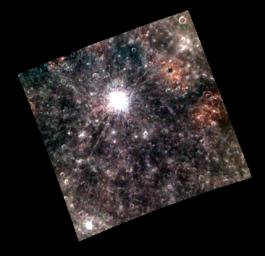Today's image shows a color view of the southern rim of the Caloris impact basin. The prominent reddish spots are associated with irregular depressions that are thought to be volcanic vents. The reddish deposits are probably formed of pyroclastic material ejected from the vents during explosive eruptions. The images were binned on the spacecraft from their original size of 1024 by 1024 to 256 by 256 pixels in order to manage space on the solid-state data recorder.
These images were acquired as part of MDIS's 8-color base map. The 8-color base map is composed of WAC images taken through eight different narrow-band color filters and covers more than 99% of Mercury's surface with an average resolution of 1 kilometer/pixel. The highest-quality color images are obtained for Mercury's surface when both the spacecraft and the Sun are overhead, so these images typically are taken with viewing conditions of low incidence and emission angles.
Date acquired: July 03, 2011
Image Mission Elapsed Time (MET): 218203157
Image ID: 458358
Instrument: Wide Angle Camera (WAC) of the Mercury Dual Imaging System (MDIS)
WAC filter: 996-nm, 559-nm, 433-nm as red-green-blue.
Center Latitude: 13.61°
Center Longitude: 154.4° E
Resolution: 1896 meters/pixel
Scale: The edges of the image are about 490 km (300 mi.) long
Incidence Angle: 14.4°
Emission Angle: 13.5°
Phase Angle: 28.0°
The MESSENGER spacecraft is the first ever to orbit the planet Mercury, and the spacecraft's seven scientific instruments and radio science investigation are unraveling the history and evolution of the Solar System's innermost planet. Visit the Why Mercury? section of this website to learn more about the key science questions that the MESSENGER mission is addressing. During the one-year primary mission, MDIS acquired 88,746 images and extensive other data sets. MESSENGER is now in a year-long extended mission, during which plans call for the acquisition of more than 80,000 additional images to support MESSENGER's science goals.
These images are from MESSENGER, a NASA Discovery mission to conduct the first orbital study of the innermost planet, Mercury. For information regarding the use of images, see the MESSENGER image use policy.

 Planetary Data System
Planetary Data System












